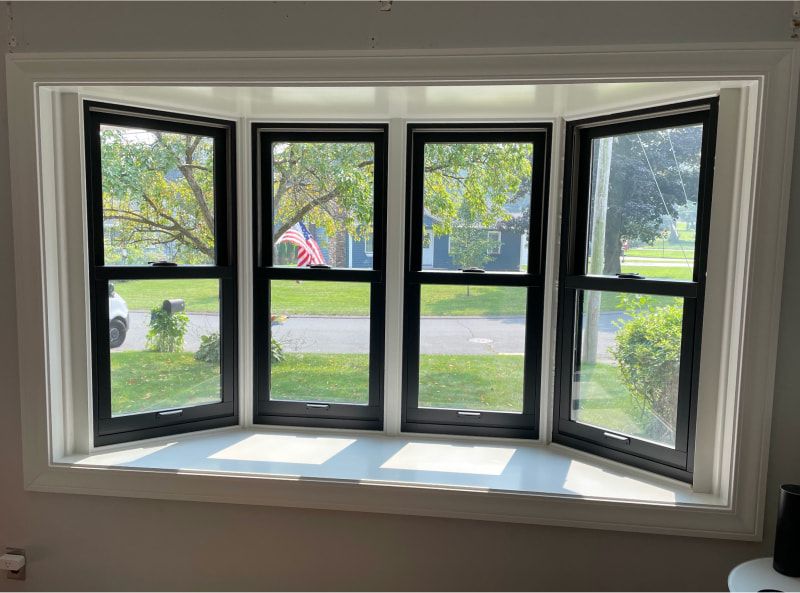When considering window replacement, one of the most important decisions homeowners face is selecting the right frame material. The material you choose affects not only the appearance of your windows but also their durability, energy efficiency, and maintenance requirements. Let's explore the various window frame materials available today to help you make an informed decision for your home.
Common Window Frame Materials: Pros and Cons
Vinyl Window Frames
Vinyl has become the most popular window frame material in modern homes, and for good reason. These frames offer excellent value through their combination of affordability and performance.
Pros:
- No painting or staining needed
- Resistant to insect damage
- Available in various colors and styles
Cons:
- Can soften, warp, or bow when exposed to extreme heat
- Less structural strength compared to other materials
- May discolor over time, especially in harsh weather conditions
- Difficult to paint if you want to change colors later
Wood Window Frames
Many professional installers and homeowners consider wood the gold standard for window frames due to its natural beauty and traditional appeal.
Pros:
- Provides natural insulation
- Can be repainted or restained to change appearance
- Can add value to historic or traditional homes
Cons:
- Requires regular maintenance to prevent rot and decay
- More expensive than vinyl options
- Susceptible to moisture damage and insect infestation
- May expand and contract with temperature changes
Aluminum Window Frames
Aluminum frames offer sleek, narrow profiles that work well in modern architectural designs.
Pros:
- Low maintenance requirements
- Recyclable and environmentally friendly
Cons:
- Poor thermal performance (conducts heat and cold)
- May cause condensation issues in cold climates
- Limited color options compared to other materials
Fiberglass Window Frames
Fiberglass has emerged as a premium option known for its exceptional durability and performance.
Pros:
- Outstanding durability with potential lifespans of 30-50 years
- Excellent thermal performance with minimal expansion/contraction
- Low maintenance requirements
- Can be painted to match your home's aesthetic
Cons:
- Higher initial cost than vinyl options
- Fewer manufacturers and style options
- Installation requires specialized expertise
- Limited color choices from some manufacturers
- Installation dust can be an irritant
Composite Window Frames
Composite frames combine materials like wood fibers and polymers to create a versatile window option.
Pros:
- Combines the strength of wood with the low maintenance of vinyl
- Good thermal performance and durability
- Resistant to rot, decay, and insect damage
- Can mimic the appearance of wood without the maintenance
Cons:
- More expensive than standard vinyl options
- Quality can vary significantly between manufacturers
- May require specialized installation knowledge
Innovative Materials: The Fibrex® Advantage
When researching window materials, it's worth noting that some manufacturers have developed proprietary composite materials that offer enhanced performance. For example, Renewal by Andersen's Fibrex® material combines the strength and insulating properties of wood with low-maintenance features.
This innovative composite material:
- Provides exceptional durability and rigidity
- Offers superior thermal insulation compared to aluminum or vinyl
- Resists warping, rotting, and corrosion
- Allows for narrower frames and more glass area
- The manufacturing process of creating window frame lineals can be toxic.
- Maintains its appearance and performance for decades
Factors to Consider When Choosing Window Frame Materials
Climate Considerations
Your local climate should significantly influence your window frame material choice:
- In hot, sunny climates: Look for materials with good heat resistance and UV protection
- In cold regions: Prioritize materials with excellent thermal insulation properties
- In coastal areas: Choose corrosion-resistant materials that can withstand salt air
- In humid environments: Select materials resistant to moisture and mold growth
Energy Efficiency
Window frame materials contribute significantly to your home's overall energy efficiency:
- Look for frames with good insulating properties
- Consider the thermal break technology in the frame design
- Remember that the frame material works in conjunction with glass options
- Check for ENERGY STAR® certification for optimal performance
Maintenance Requirements
Be realistic about the maintenance you're willing to perform:
- Wood requires regular painting/staining and inspection
- Vinyl and fiberglass need only occasional cleaning
- Aluminum may require periodic checks for corrosion
- Composite materials typically offer low maintenance benefits
Aesthetic Considerations
Your windows should complement your home's architectural style:
- Traditional homes often pair well with wood frames
- Modern designs may benefit from sleek aluminum or fiberglass
- Consider whether you want the ability to change colors in the future
- Some materials offer more design flexibility than others
Making the Right Investment
Window replacement is a significant investment in your home. While initial cost is important, consider the long-term value:
- Durability: Materials like fiberglass and quality composites may cost more initially but can last decades longer than budget options.
- Energy savings: Superior insulating frames can reduce heating and cooling costs year after year.
- Maintenance costs: Factor in the time and expense of maintaining your windows over their lifetime.
- Home value: Quality windows with premium materials can enhance your home's resale value.
The Importance of Professional Installation
Even the highest quality window frame material won't perform properly without expert installation. Professional installation ensures:
- Proper sizing and fitting
- Correct sealing to prevent air and water infiltration
- Structural integrity and operation
- Warranty protection
Many window replacement companies offer comprehensive consultations to help homeowners understand which materials would work best for their specific homes and needs.
Conclusion
There is no single "best" window frame material for every situation. The ideal choice depends on your home's architecture, your climate, budget considerations, and personal preferences. By understanding the strengths and limitations of each material option, you can make an informed decision that enhances your home's comfort, efficiency, and appearance for years to come.
When evaluating window replacement options, consider consulting with window professionals who can assess your specific needs and recommend materials that will provide the best long-term value for your home.
Schedule a Consultation
